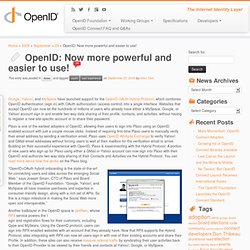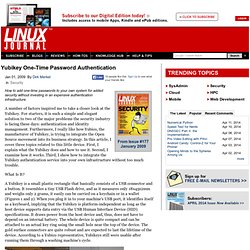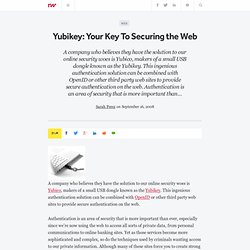

Now more powerful and easier to use! Google, Yahoo!

, and MySpace have launched support for the OpenID OAuth Hybrid Protocol, which combines OpenID authentication (sign in) with OAuth authorization (access control) into a single interface. Websites that accept OpenID can now let the hundreds of millions of users who already have either a MySpace, Google, or Yahoo! Account sign in and enable two-way data sharing of their profile, contacts, and activities, without having to register a new site-specific account or to share their password. Plaxo is one of the earliest adopters of OpenID, allowing their users to sign into Plaxo using an OpenID enabled account with just a couple mouse clicks. Instead of requiring first-time Plaxo users to manually verify their email address by sending a verification email, Plaxo uses OpenID Attribute Exchange to verify Yahoo!
Another trailblazer in the OpenID space is JanRain, whose RPX service powers the l ogin and registration flows for their customers, including Qype and MySears. P.S. Yubikey One-Time Password Authentication. A number of factors inspired me to take a closer look at the Yubikey.

For starters, it is such a simple and elegant solution to two of the major problems the security industry is facing these days: authentication and identity management. Furthermore, I really like how Yubico, the manufacturer of Yubikey, is trying to integrate the Open Source movement into its business strategy. In this article, I cover three topics related to this little device. First, I explain what the Yubikey does and how to use it. Second, I examine how it works. A Yubikey is a small plastic rectangle that basically consists of a USB connector and a button. Each time you press the button on the device, it generates a one-time password and sends it to the host machine as if you had entered it on a keyboard. I use RoundCube to read my e-mail when I don't have access to my own system. Normally, RoundCube asks you to enter your e-mail address and password to log in. Tlerefhcvijlngibueiiuhkeibbcbecehvjiklltnbbl.
Yubikey: Your Key To Securing the Web. A company who believes they have the solution to our online security woes is Yubico, makers of a small USB dongle known as the Yubikey.

This ingenious authentication solution can be combined with OpenID or other third party web sites to provide secure authentication on the web. Authentication is an area of security that is more important than ever, especially since we're now using the web to access all sorts of private data, from personal communications to online banking sites. Yet as those services become more sophisticated and complex, so do the techniques used by criminals wanting access to our private information. Although many of these sites force you to create strong passwords, a password alone is not your best defense against identity thieves.
For the best security, multi-factor authentication is needed, and that's what Yubikey provides. Security Matters At first glance, you may dismiss Yubikey as yet another smart card to carry around. Yubikey + OpenID Will Yubikey Take Off? Announcing Emailtoid: mapping email addresses to OpenIDs. The other night at Beer and Blog in Portland , fellow Vidooper Michael T Richardson announced and launched a new service that I’m both excited and a little apprehensive about. The service is called Emailtoid , and while I prefer to pronounce is “email-toyed”, others might pronounce it “email two eye-dee”. And depending on your pronunciation, you might realize that this service is about using an email address as an ID — specifically an . This is not a new idea , and it’s one that been debated and discussed in the OpenID community an awful lot , which culminated in a rough outline of how it might work by Brad Fitzpatrick following the Social Graph FOO Camp this past spring, and that David Fuelling turned into an early draft spec .
Well, we looked at this work and this discussion and felt that sooner or later, in spite of all the benefits of using actual URLs for identity , that someone needed to take a lead and actually build out this concept so we have something real to banter about.